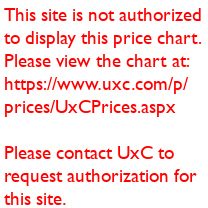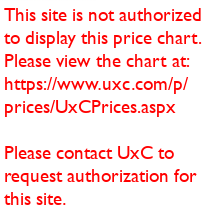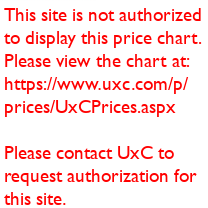Periodicals
Headline News
Ux Weekly
SpentFUEL
StoreFUEL
Market Outlook Reports
Uranium Market Outlook
Conversion Market Outlook
Enrichment Market Outlook
Fabrication Market Outlook
Special Products
UxC Training Seminar
Nuclear Power Outlook
UxC Requirements Model
Uranium Suppliers Annual
UxC's Policy Watch
UxC Seminars, Webinars & Videos
UxC's next Nuclear Fuel Training Seminar is scheduled for June 23-26, 2025 in Vienna, Austria
UxC announces new Nuclear Fuel Market Webinars for clients

Recent Special Reports
Conversion & Enrichment Supplier Assessments - Dec 2024
Uranium Suppliers Annual 2024 - Dec 2024
Global Nuclear Fuel Inventories 2024 - Aug 2024
Uranium Suppliers Annual 2023 - Dec 2023
Conversion & Enrichment Supplier Assessments - Dec 2023
Market Outlook Report Essays
Extending UxC Forecasts to 2045 - Q1 2025
How to Mend Conversion and Fix the Weakest Link - Dec 2024
Extending UxC Forecasts to 2045 - Q1 2025

UxC's Uranium Market Outlook (UMO) highlights recent developments and their impact on the market.
Each UMO quarterly report covers key supply and demand developments as well as the overall supply and demand situation, reviews spot and long-term contract activity over the past three months, provides a near-term technical analysis along with detailed spot market indicators, projects prices under different market scenarios with associated probabilities, and examines key developments in the market through a topical essay.
This quarter's essay, "Extending UxC Forecasts to 2045," presents UxC's latest projections for uranium supply and demand, which have now been extended by five years to 2045 starting with this Q1 2025 edition. Details of the latest forecast scenarios and what they tell us about the longer-term direction of the uranium market fundamentals are presented.
Also included are a review of recent market activity and a look a current and prospective activity, and a detailed listing of reactor and production developments that promise to shape the future market.

Uranium Suppliers Annual
Sometimes referred to as "The Uranium Bible", the Uranium Suppliers Annual contains comprehensive data and information on all of the world's uranium suppliers, including detailed sections on planned producers and junior/exploration companies.
Whether you are a utility, producer, trader, or investor, the Uranium Suppliers Annual provides the basis for understanding potential future developments surrounding the availability of supply, particularly since uranium production has continued to be sub-par against a backdrop of growing demand. In light of the increasing volatile nature of the uranium market, primary and potential suppliers are continuously re-evaluating their properties and future production plans, as well as expanding exploration programs where economically feasible.

Uranium Production Cost Study
The Uranium Production Cost Study complements UxC's Uranium Market Outlook (UMO) and Uranium Suppliers Annual (USA) in identifying where expanded and new uranium supply will come from over 100 worldwide projects to meet future nuclear fuel demand through 2035.

UxC's Conversion Market Outlook (CMO) details an often overlooked market.
Each bi-annual report covers key supply and demand developments as well as the overall supply and demand situation, reviews spot and long-term contract activity over the past three months, provides a near-term technical analysis along with detailed spot market indicators, projects prices under different market scenarios with associated probabilities, and examines key developments in the market through a topical essay.
Chapter 1 presents our essay "How to Mend Conversion and Fix the Weakest Link," which examines all the factors that have led to the current dire state of the conversion market, including historically high prices and extremely tight supplies, and what measures can be taken to improve the health of the market and put the conversion sector on firmer footing to support nuclear power's rising future outlook.
Also included are a review of recent market activity and a look a current and prospective activity, and a detailed listing of reactor and production developments that promise to shape the future market.

Conversion & Enrichment Supplier Assessments (CESA)
Since 2020, UxC has been publishing annual editions of its Conversion & Enrichment Supplier Assessments (CESA) report. This report addresses important questions about supply reliability in the conversion and enrichment markets, and provides a risk assessment tool to compare all active suppliers within these markets.

UxC's Enrichment Market Outlook (EMO) Covers a Dynamic and Key Segment of the Overall Nuclear Fuel Market.
Enrichment developments not only are important for understanding the enrichment market, but are also crucial for understanding the future progression of the uranium market. Since uranium and enrichment are substitutes, increases in enrichment supply can have a major impact on the future demand for uranium. Each EMO quarterly report covers key supply and demand developments as well as the overall supply and demand situation, reviews spot and long-term contract activity over the past three months, provides a near-term technical analysis along with detailed spot market indicators, projects prices under different market scenarios with associated probabilities, and examines key developments in the market through a topical essay.
This quarter's essay, "Extending UxC Forecasts to 2045," presents UxC's latest projections for enrichment supply and demand, which have been extended by five years to 2045 starting with this Q1 2025 edition. Details of the latest forecast scenarios are presented, offering insights into the longer-term direction of SWU market fundamentals.
Also included are a review of recent market activity and a look a current and prospective activity, and a detailed listing of reactor and production developments that promise to shape the future market.

Conversion & Enrichment Supplier Assessments (CESA)
Since 2020, UxC has been publishing annual editions of its Conversion & Enrichment Supplier Assessments (CESA) report. This report addresses important questions about supply reliability in the conversion and enrichment markets, and provides a risk assessment tool to compare all active suppliers within these markets.

UxC's Fabrication Market Outlook (FMO)
With a long history of tracking the unique fabrication market, UxC issues an annual comprehensive and up-to-date Fabrication Market Outlook (FMO) report addressing the commercial, economic, institutional, and technical aspects of this sector. Fabrication differs greatly from other steps in the fuel cycle. Its high technical content, need for regulatory approval, and the restriction of fuel assemblies to specific reactors require a unique approach to its analysis. To those with little knowledge of fuel fabrication and its markets, this report can serve as a primer providing a solid background and understanding of how its markets function. To those knowledgeable in the fundamentals, it offers analyses of a variety of its aspects based on several decades of participation. To those who are actively involved in the industry, it supplies additional insights to assist in the improvement of existing nuclear fuel programs and in the development of new ones.
This year's in-depth topical essay in Chapter 1 - Essay: Recent Fabrication Market Highlights and Trends five major trends now shaping the global fuel fabrication markets. This includes: fabricators upgrading plants and preparing for rising demand, the massive shifts underway in Central and Eastern Europe's VVER market, the latest push to deploy Accident Tolerant Fuels (ATFs), High Burnup Fuels (HBFs), and LEU+ fuel, the potential for new fabrication plants to be built in certain markets, as well as ongoing preparations for HALEU and related unique fuel designs for small, advanced, and micro reactors (SAMRs).
UxC's Nuclear Grade Zirconium Alloy Market Outlook

UxC has prepared a new special report to provide an overview of the zirconium alloy market for the nuclear industry entitled Nuclear Grade Zirconium Alloy Market Outlook. Nuclear-grade zirconium alloys and products are used in the fabrication of fuel assemblies, which are used in the vast majority of nuclear reactor designs either currently operating, under construction, or planned around the world. As the nuclear renaissance takes hold in countries all over the globe, many questions about the international nuclear supply chain have arisen. The supply of nuclear-grade zirconium - from zircon mineral sand through the cladding and components used in finished fuel assemblies - has also not escaped this scrutiny. Therefore, the primary objective of this report is to factually and analytically approach the current and expected future direction of the nuclear-grade zirconium market to help formulate clear conclusions about how producers of fuel assemblies for nuclear reactors will obtain the necessary zirconium for their finished products.

UxC's Nuclear Power Outlook (NPO)
The NPO report is the most comprehensive and frequently updated report used by leading companies and institutions around the world to assess the future of the nuclear power market. Each NPO quarterly report includes detailed reviews of the latest nuclear power developments around the world by country and region. The report also includes proprietary reactor forecast scenarios for every country through 2050 based on expert analysis. Each edition also examines key issues and trends in the nuclear power market through topical essays.
This quarter's Chapter 1 - Nuclear Power Market Trends & Analysis starts with our annual "Year in Review," which provides a full recap of the key developments and nuclear market trends from 2024. Additionally, we examine potential future developments through our take on expectations for the nuclear markets in the coming year. Our "In The Spotlight" section reviews several recent new global energy and nuclear power projections, including those published by the OECD IEA, IAEA, and BP.
Also included are a review of recent market activity and a look a current and prospective activity, and a detailed listing of reactor and production developments that promise to shape the future market.
Additional reactor statistics and various data sets are also provided as part of the NPO quarterly service.
Moreover, for clients looking to access UxC's proprietary nuclear fuel requirements projections that are derived from the NPO, the UxC Requirements Model (URM) quarterly service can be added to the NPO subscription.

UxC Analyzes Reactor Technology
UxC, the industry leader in global nuclear market analysis, is pleased to announce a new report titled Small, Advanced and Micro-Reactor Assessments (SAMRA). This new report, to be published in 2023, provides comprehensive profiles of the world's most promising new and advanced reactor designs along with cutting edge market analysis of the viability of these technologies in the future energy marketplace.

In March 2013, UxC issued a new special report on the SMR Market Outlook (SMO). This 450 page report provides comprehensive commercial and technical analysis of the overall SMR market and detailed reviews of the leading SMR designs in the world. The SMO report is the result of UxC's continuing efforts to provide its global clients with insightful products and services in the SMR sector. It includes a global SMR market review along with a global outlook for SMR market developments as well as deployment forecasts to 2040.
In December 2010, UxC issued a groundbreaking special report on Small Modular Reactor Assessments (SMRA). This report's objective is to provide technical, economic, and other commercial assessments of each of the SMR designs being developed in the world today. In addition, the report provides an in-depth discussion of the broader issues impacting SMRs, such as the keys to successful deployment for SMRs, comparisons with larger reactor technologies, specific applications for SMRs, and the broader issues facing potential customers for SMRs.
In August 2008, UxC completed a special report on Nuclear Reactor Technology Assessments (NRTA). This in-depth study provides nuclear reactor technology assessments and overall evaluations of the major reactor designs currently available in the world. The decision of which reactor design to pursue is an extremely important one and must be based on many factors, such as the robustness of the technology, the constructability of the plant, the plant economics - both initial and operating, the type of fuel used, the ability to license and regulate, among a variety of other considerations.


UxC's SpentFUEL and StoreFUEL
UxC is not only expanding its geopolitical coverage of the market, but is also now covering more of the fuel cycle. In June 2007, UxC began to publish SpentFUEL and StoreFUEL, two leading newsletters dealing with the backend of the fuel cycle.
Both publications cover major fuel cycle and backend-related conferences in detail. In addition, UxC can advise clients in issues related to the back end of the fuel cycle, including profiles of utility spent fuel storage facilities and plans, country profiles, vendor profiles, etc.

